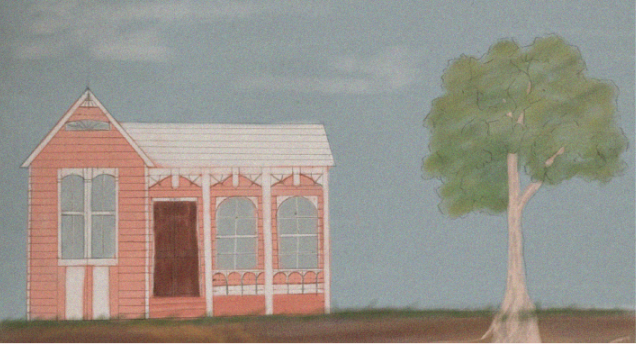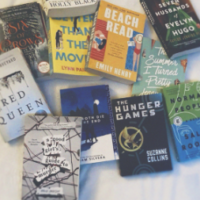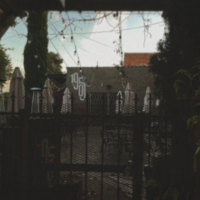
She was nostalgic for every time before the present. It hurt to remember.
She was homesick. Homesick for biking over those rolling green hills, lying in patches of shaded grass and gazing up at that cloudless blue sky; homesick for being awoken at the break of dawn by the sound of birds chirping outside of a cracked window and the single ray of sunshine that slipped through the curtain, bringing warmth to her face and casting a bright light over her eyes. She was homesick and carried that feeling with her everywhere, but its weight never lessened.
There was never a quiet moment in the city. She would wake up in the middle of the night to a car’s wheels braking and fall asleep to the rattled breathing of the dusty air conditioner sitting in her window. The sun’s light was blocked by clouds and her room remained a dull gray.
She was shocked as she opened a window in an attempt to air out the smell of unswept floors, as the subtle waves of outside voices grew to an unprotected, ear-piercing cacophony of barking dogs, car horns and calls for taxi cabs.
Wearing the same shirt that she had worn the past three days, she walked to the kitchen. Every step through the hallway was followed by a tired creak from the floorboards. A faint light shone through her windows, illuminating the dust particles in the air. It was technically still summer, but the skies had gone gray and cloudy, shrouding the busy streets in a light fog. Raindrops pattered on the windows, forming thin rivers and canals that ran into the corners of the glass.
The pantry was bare, save a half-emptied box of Honey Nut Cheerios. Pouring some into a bowl, she grabbed a spoon from the silverware piled haphazardly on the counter and sat on the couch, wrapping herself in a patchwork quilt. She looked out the window at the building across the street.
In one window on the top floor was an old wooden candelabra. Two to the right were decorated with hanging blue and white birthday streamers. On the fire escape of the apartment a floor below were three terracotta pots of varying sizes, the smallest holding mint, the medium rosemary and the largest basil. An orange tabby cat slept in the window three spaces to the left. The window straight across from her held a vase of flowers — red-tipped tulips with strands of English lavender poking out.
Looking around the room she sat in, she felt ashamed. She remembered walking on city streets as a young girl and
looking at the balconies above, pointing at the ones she liked most. Now, hers was empty. The lights were off inside and no plants stood in the sills. It was as if she had disappointed the youthful soul within her.
She was supposed to be more. Her life was meant to be thrilling and beautiful, full of endless stories to tell her grandchildren. Instead she sat in an empty apartment, miles away from any friends or family, eating a bowl of stale cereal. She was letting her life slip through her fingers. When she was gone, there would be no trace left of her presence — no initials carved into trees, no handprints left in wet concrete and not one plant that would wilt without her care.
She sighed and put away her dish and spoon, then got dressed to go buy groceries. She grabbed a crossbody bag and put on her rain boots. A cold breeze bit at her face and crisp red and orange leaves crackled under her boots as she walked to Trader Joe’s. She was not accustomed to Salem’s climate and was still slightly chilly even with her long sleeves and knit sweater under a padded rain jacket.
After five or so minutes of moving past groups of slow walkers and smiling at strangers’ dogs, her mood began to lift. Turning a corner, she passed some food trucks and was greeted by the warm aroma of freshly-cooked pastels. Couples sat talking and playing cards on the picnic benches that occupied the empty lot and people stood huddled around heating lamps as they waited to place their orders.
As she entered the store, she looked around at the recognizable wooden shelving and colorful hand-painted signs advertising spiced apple cider. The corner to her right was lined by a tiered stage of pink peonies, yellow sunflowers and a warm-toned color wheel of red, orange, magenta and white Peruvian lilies. She decided to buy a bundle of the orange ones. Set in a window, the vase of flowers would bring a burst of color to her bland, undecorated flat.
Continuing with her shopping, she bought two Granny Smith apples, one lemon, a box of chamomile tea, a loaf of bread, three avocados, a liter of milk and a carton of eggs. She paid and seconds after exiting, it began to rain.
At first, the rain was a light sprinkle, but by the time she passed the row of food trucks, it was pouring. The tin overhangs of the trucks rattled as they were pummeled with dancing drops.
The blocks ahead had blurred with a white fog, and she regretted not bringing an umbrella, as she had to shield her groceries from the downpour by awkwardly carrying the bag inside of her raincoat. Once she made it into her building she let out a big sigh and let the warmth soak back into her bones, then started up the many flights of stairs that would eventually lead to her unfamiliar home.
After turning the keys in the lock and pushing open the door, she set down her bag, kicked off her boots and peeled off her raincoat. She put away her groceries and decided to make herself an omelet for lunch. As she whisked the eggs, the rain came to a stop and revealed a bright, cloud-covered sky. It wasn’t the vibrant blue sky she was used to but a gentle and solemn one, and its softness soothed an aching in her chest.
After eating lunch she turned on the radio and spent the afternoon organizing her kitchen. Yo La Tengo played as she hung up pictures, sorted books and decided which drawer would be best for plates and bowls and which for pots and pans. As the sun set, rectangular slants of golden sun were cast along her walls. She stared at them as she fell asleep.
She dreamt for the first time in a while. The field had burnt many years ago, and in its place, a forest had grown. It was beautiful, a sight that she had not expected. She thought that the fallen logs would rot, that the grass would remain dust and the leaves would never green again, but she was wrong.
She woke up to the recognizable salty smell of wet asphalt and a cool breeze blowing over her face, signaling the beginning of autumn. She looked out her window, down onto the rain-freckled sidewalk and the rows of auburn trees that lined it, the flowing crowd of morning commuters weaving through — a sea of black, white and translucent umbrellas.
She yearned for life so she surrounded herself with it. She planted not flowers but seeds. She drank loose-leaf tea and brushed her teeth twice daily. She left the curtains open, reflecting the sky onto her floors so that she could walk with both head and feet in the clouds. She wanted to simply be, so she simply was.
As she pulled open a window she realized that something was different, but she couldn’t quite grasp what it was. If nothing, then was it her? Her that had changed like the seasons. Changed with them, a blade of grass green in spring, parched yellow in summer and brought back to life again by the autumn showers before freezing in winter, just to do it all over.
Yet through all the change one thing remained consistent: Each day the sun rose and each night it set. She looked up at the sky; though the stars she saw were in different positions and the window she gazed through bore no cracks, she had come to realize that they were just as beautiful here as they were there.




